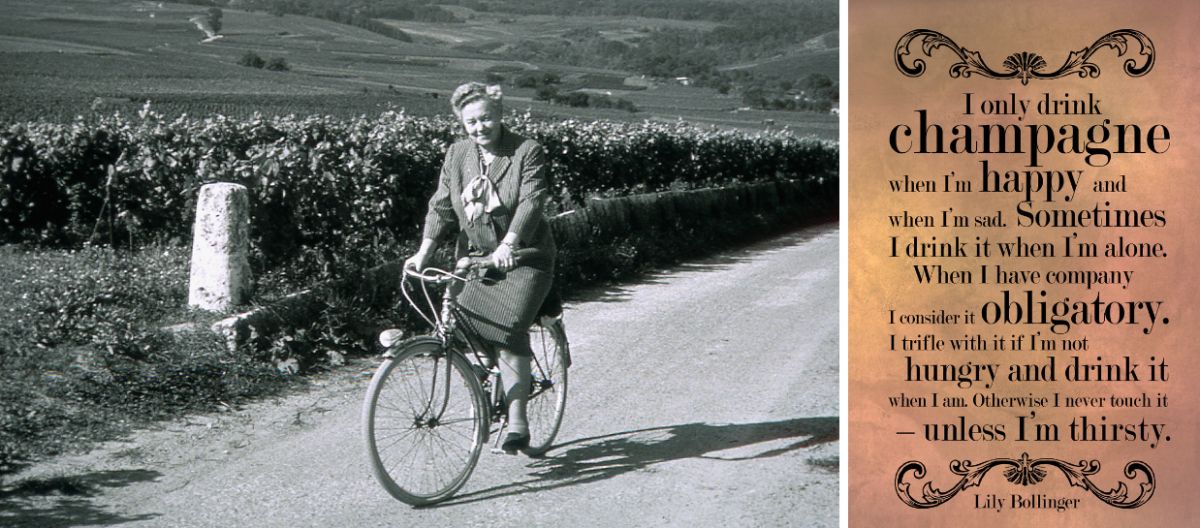Joseph-Jacob-Placide Bollinger (1803-1884), a nobleman from the Kingdom of Württemberg, joined the Chamapgner company Müller-Ruinart in 1822. He was extremely successful as a commercial agent in Germany until 1829. In that year, he and two partners founded the famous champagne house in Aÿ near the city of Reims, which was then known as Renaudin-Bollinger. The Count and Admiral Athanase-Louis-Emmanuel de Villermont (1763-1840) was involved in the wine trade and contributed extensive vineyard property. The third was Paul Renaudin, who had also previously worked for Müller-Ruinart as a sales representative, but who left the young company shortly afterwards. Since the count did not want to be mentioned by name, the company was henceforth called Bollinger. He now called himself Jacques Bollinger and married Louise-Charlotte de Villermont, the Count's daughter, in 1837. As early as 1865, champagne was exported to England and in 1884 the house became the purveyor to the court of Queen Victoria (1819-1901) and was awarded the "Royal Warrant".
After the death of the founder, his sons Joseph and Georges successfully continued the business and acquired additional vineyards around Bouzy, Louvois, Tauxieres and Verzenay. In 1918, a grandson of the founder with the same name Jacques Bollinger (1894-1941) took over the management of the company. After his early death, his widow Elisabeth "Lily" Bollinger (1899-1977) took over the business during the German occupation. The Wehrmacht not only confiscated the company's building, but also 178,000 bottles of the champagne in stock. However, this continued to be produced despite the difficult circumstances. The legendary Madame then directed the fortunes of the house for four decades. Under her leadership, production was doubled. She travelled around her vineyards by bicycle until old age.

In 1971, Madame Bollinger transferred the management of the company to her nephew Claude d'Hautefeuille (1913-2000). One year before her death, she was awarded the Order of National Merit by the French state. Already legendary and often recounted is her witty answer to a reporter's question about the occasions on which she drank champagne: " I drink it when I am happy, and I also drink it when I am sad. Sometimes I drink it when I'm alone; in company I drink it anyway. Even when I don't have an appetite, I like to have a glass. And if I have an appetite, of course I also take it. But otherwise I don't touch it, except - when I'm thirsty. (see many other sayings of famous personalities about wine under Quotes). From 1978 to 1994, Christian Bizot (1928-2002), son of Lily Bollinger's younger sister, was the sixth president of the company. He introduced the use of a label with valid information on all Bollinger champagnes without a vintage. This brought about absolute transparency, as it was now clear which grape varieties had been used and how long the wines had been aged. This data is kept strictly secret in many other houses.
In 1985, Bollinger acquired 40% of the Australian company Petaluma and was instrumental in the development of a sparkling wine cellar in Adelaide. Ghislain de Montgolfier (also a nephew of Lily Bollinger) has been responsible as the seventh president since 1994. Unlike many others, the company is still family-owned. Today, its own vineyards cover 152 hectares of vines in the best crus, including the communes of Aÿ, Bouzy and Verzenay. Around 60% are considered Grand Cru and another 30% Premier Cru.
The products of the house are produced under the strictest quality controls on the basis of mainly Pinot Noir grapes, partly with barrel fermentation (which is otherwise not common in Champagne) and very long lees ageing. The reserve wines are not stored in large barrels but, sorted by cru and vintage, in individual magnum bottles corked under light pressure. Only the must from the first pressing (cuvée) is used. The must from the second pressing (Taille) is sold to other winegrowers. Only in the case of Chardonnay is Taille sometimes also used in the best vintages. The first fermentation of the wines, sorted by cru, takes place in (naturally French) barriques and stainless steel tanks. Non-vintage Champagne is stored on the lees for at least three years, vintage Champagne for at least five to eight years.
For particularly good vintages, a vintage Champagne called "Grande Année" is produced, which is kept on its lees for at least five years after the second fermentation in the bottle. A little still red wine from vineyards around Aÿ is added to the "Grande Année Rosé". The rarest champagne is the mono-cuvée "Vieilles Vignes Françaises", which is produced in small quantities (maximum 2,000 bottles per year) from old, ungrafted or ungrafted Pinot Noir vines from a vineyard that has been spared from phylloxera. After disgorgement, all champagnes must rest for at least three months before they are delivered. The designation Récemment dégorgé (RD), which is reserved for Bollinger, is legally protected on the label of special champagnes. Around 1.5 million bottles are produced annually. The products are exported to a total of 80 countries worldwide.
In the 2002 film Die Another Day, 007 (Pierce Brosnan) enters the lobby of the Peninsula Hotel in Hong Kong after narrowly escaping death, badly battered, where the waiter recommends a lobster garnished with quail egg. Bond smiles approvingly and says: "And don't forget the '61 Bollinger". A Limited Edition Millésime (vintage champagne) is produced with "007" emblazoned on the label.
Lily Bollinger: By Bollinger site, Fair use, Link
Voices of our members

For me, Lexicon from wein.plus is the most comprehensive and best source of information about wine currently available.
Egon Mark
Diplom-Sommelier, Weinakademiker und Weinberater, Volders (Österreich)